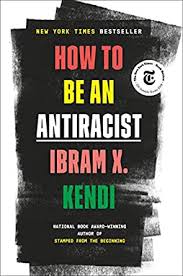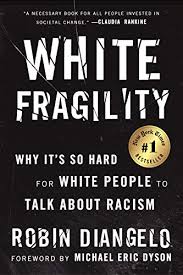For Day 3 in Amplify Black Voices in Publishing, I interview Ali Raja, MD. I was introduced to Dr. Ali Raja by Dr. Tiffany Love on Twitter. I told her that I’d realized my list of interviewees for this series was all women so far. We needed some gender diversity!

She said, “How about Dr. Ali Raja? He’s very active on twitter in the #WhiteCoats4BlackLives movement/conversation.” His thought-provoking responses to my questions follow.
A note about links to buy books
Note: Rather link to books on Amazon, here is a link to a recent list of Black-owned bookstores that ship nationally. You can use the stores on this list to order the books mentioned in this post.
Books and Blogs to Understand Racial Justice Issues
Lisa: When it comes to understanding racism: history/how we got here, uncovering our own unconscious biases, learning what we can do in terms of our own behaviors as well as contributing to societal, legal and institutional change, what books or blogs do you recommend reading?
 Dr. Raja: I know that it’s on every list, but there’s a reason for it: Ibram X. Kendi’s How to Be Anti-Racist was truly eye-opening, and – most importantly – provides a clear path from the development of a society full of anti-racists. I’m so excited that he is joining the faculty at BU up here in Boston.
Dr. Raja: I know that it’s on every list, but there’s a reason for it: Ibram X. Kendi’s How to Be Anti-Racist was truly eye-opening, and – most importantly – provides a clear path from the development of a society full of anti-racists. I’m so excited that he is joining the faculty at BU up here in Boston.
-> [Order How to Be an Anti-Racist from a Black-owned bookstore here.]
I’ve found this second book useful because of my family. While I was born in Pakistan and moved here as a child, my wife’s family is white and has been in the country for generations. Being Pakistani in Texas came with its own set of challenges, and I haven’t found myself giving the unconsciously defensive responses to racism that they have. Reading Robin Diangelo’s White Fragility allowed me to understand more about why they feel the way that they feel, which will hopefully allow us to keep learning and changing together.
-> [White Fragility seems to be temporarily out of stock everywhere. You can order a used version on Amazon right now.
[bctt tweet=”How Writers Can Amplify Black Voices” username=”LisaTener”]
Lisa: Thank you! I have both books on order, though it’s taking forever. It’s been a little frustrating that many books on racial justice are sold out, but I’m hoping that’s a positive (so many people want to read about the issues) and not a negative (publishers aren’t getting out these important books in an effective manner).
As writers, how can we best use our voice and platform to amplify voices of African Americans and other Black people?
Dr. Raja: It’s so important that this be conscious, intentional and action-oriented. We’ve all seen so much lip service over the years (and even now) with very little change. For those of us who have visibility and voice in certain environments, it’s important to take time to find those whose voices are not being heard in that environment and to make sure they are represented. The recent #BWMTakeover (and others like it) was a great example of this.
Lisa: I think that’s a concern in many people’s minds. “Will this time be different? Will we make real change, not just a baby step or incremental changes, but can we transform our laws, our institutions, our minds, as a country?
As authors and bloggers, what can we do better to uncover our own unconscious biases and write inclusively? What questions should we ask ourselves before pressing “publish” on a blog post or submitting our chapters to our publishing house?
Dr. Raja: Most experienced authors have both a thick skin and an understanding that the majority of criticism is based on a kernel of truth (some, of course, just comes from a bad place). However, I bet most of us (me included) have used the same sets of eyes to review our work for years, and those eyes are often surrounded by faces that look like ours. We should all have more diverse reviewers take a look at our work before it goes out there, but also ensure that those reviewers are appropriately compensated for their time.
[bctt tweet=”How to Diversify Your Circle of Beta Readers and Influences” username=”LisaTener”]
 Lisa: Some of our readers may not have a wide or diverse social circle. If they want to reach out to gather a more diverse group of beta readers, do you have suggestions for how they can find appropriate beta readers?
Lisa: Some of our readers may not have a wide or diverse social circle. If they want to reach out to gather a more diverse group of beta readers, do you have suggestions for how they can find appropriate beta readers?
Dr. Raja: Normally, I’d suggest the usual local author meet-ups and gatherings, but in the era of social-distancing this just doesn’t work. I’ve found that social media is a great substitute here, but it does take a fair bit of effort to weed through the trolls and bots. Find a group on Facebook and be honest about why you’re reaching out – compensated beta-readers with a diverse background – and you’ll get some new reviewers in your circle.
Lisa: That’s a great idea. I’ve just sent a book to a couple of beta readers, uncompensated, thinking I will return the favor at some point, but I like the idea of compensating people up front. How can the publishing industry do a better job of getting established authors of any background to mentor and sponsor aspiring African American authors and help them get published?
Dr. Raja: Most successful people I know have far more to do than they have time for. The key is to quantify the time commitment early (15 minutes a week?) and send specific questions and background beforehand. When I’m mentoring someone who reaches out with this information beforehand, I give my answers a lot more thought – whether it’s when I’m brushing my teeth or driving – than just during the time we have allotted. In this current era, I think that the appetite for mentoring and sponsoring aspiring African American authors has definitely grown… but this mentoring still needs to fit into the lives of their potential mentors.
Lisa: That’s great. And reminds me that you don’t have to send someone the whole book. If they’re busy, perhaps just send a chapter or two. You can send different chapters to different readers. Is there anything you wish I asked? What would you like to leave our readers with?
Dr. Raja: I think this time is different. There’s just something about the confluence of ready availability of video, social media advocacy, and a generation willing to make its voice heard that has our culture ready for a long-overdue change. We just can’t quit pushing until we break through and see it happen.
Lisa: Amen!
Ali Raja, MD is an academic emergency physician in Boston. His greatest passions are the care of critically ill patients, teaching the next generation of physicians, and trying to spend enough time with his amazing family. He’s a strong supporter of both #GetUsPPE and #whitecoats4blacklives, and can be followed on Twitter at @AliRaja_MD.
Read our other interviews in the “Amplify Black Voices in Publishing” series interviews with Gael Sylvia Pullen, Dr. Froswa’ Booker-Drew and Dr. Tiffany Love.

